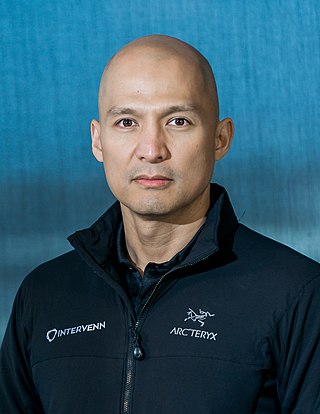Prostate cancer screening is the screening process used to detect undiagnosed prostate cancer in men without signs or symptoms. When abnormal prostate tissue or cancer is found early, it may be easier to treat and cure, but it is unclear if early detection reduces mortality rates.
In medicine, a biomarker is a measurable indicator of the severity or presence of some disease state. It may be defined as a "cellular, biochemical or molecular alteration in cells, tissues or fluids that can be measured and evaluated to indicate normal biological processes, pathogenic processes, or pharmacological responses to a therapeutic intervention." More generally a biomarker is anything that can be used as an indicator of a particular disease state or some other physiological state of an organism. According to the WHO, the indicator may be chemical, physical, or biological in nature - and the measurement may be functional, physiological, biochemical, cellular, or molecular.

Avesthagen Limited is an integrated systems biology platform company headquartered in Bangalore, India. It was founded as an academic startup in 1998 by Villoo Morawala-Patell, a Rockefeller Fellow and grantee within NCBS-UAS, Bangalore. Avesthagen started business operations on March 21, 2001 with Series-A round investment led by ICICI Ventures and Tata Industries. Villoo Morawala Patell, is the Chairperson and Managing Director of Avesthagen Limited.

Computer-aided detection (CADe), also called computer-aided diagnosis (CADx), are systems that assist doctors in the interpretation of medical images. Imaging techniques in X-ray, MRI, endoscopy, and ultrasound diagnostics yield a great deal of information that the radiologist or other medical professional has to analyze and evaluate comprehensively in a short time. CAD systems process digital images or videos for typical appearances and to highlight conspicuous sections, such as possible diseases, in order to offer input to support a decision taken by the professional.
Digital polymerase chain reaction is a biotechnological refinement of conventional polymerase chain reaction methods that can be used to directly quantify and clonally amplify nucleic acids strands including DNA, cDNA, or RNA. The key difference between dPCR and qPCR lies in the method of measuring nucleic acids amounts, with the former being a more precise method than PCR, though also more prone to error in the hands of inexperienced users. PCR carries out one reaction per single sample. dPCR also carries out a single reaction within a sample, however the sample is separated into a large number of partitions and the reaction is carried out in each partition individually. This separation allows a more reliable collection and sensitive measurement of nucleic acid amounts. The method has been demonstrated as useful for studying variations in gene sequences—such as copy number variants and point mutations.

Cervical cancer screening is a medical screening test designed to identify risk of cervical cancer. Cervical screening may involve looking for viral DNA, and/or to identify abnormal, potentially precancerous cells within the cervix as well as cells that have progressed to early stages of cervical cancer. One goal of cervical screening is to allow for intervention and treatment so abnormal lesions can be removed prior to progression to cancer. An additional goal is to decrease mortality from cervical cancer by identifying cancerous lesions in their early stages and providing treatment prior to progression to more invasive disease.

Circulating tumor DNA (ctDNA) is tumor-derived fragmented DNA in the bloodstream that is not associated with cells. ctDNA should not be confused with cell-free DNA (cfDNA), a broader term which describes DNA that is freely circulating in the bloodstream, but is not necessarily of tumor origin. Because ctDNA may reflect the entire tumor genome, it has gained traction for its potential clinical utility; "liquid biopsies" in the form of blood draws may be taken at various time points to monitor tumor progression throughout the treatment regimen.
A liquid biopsy, also known as fluid biopsy or fluid phase biopsy, is the sampling and analysis of non-solid biological tissue, primarily blood. Like traditional biopsy, this type of technique is mainly used as a diagnostic and monitoring tool for diseases such as cancer, with the added benefit of being largely non-invasive. Liquid biopsies may also be used to validate the efficiency of a cancer treatment drug by taking multiple samples in the span of a few weeks. The technology may also prove beneficial for patients after treatment to monitor relapse.

Exact Sciences Corp. is an American molecular diagnostics company based in Madison, Wisconsin specializing in the detection of early stage cancers. The company's initial focus was on the early detection and prevention of colorectal cancer; in 2014 it launched Cologuard, the first stool DNA test for colorectal cancer. Since then Exact Sciences has grown its product portfolio to encompass other screening and precision oncological tests for other types of cancer.
Circulating free DNA (cfDNA) (also known as cell-free DNA) are degraded DNA fragments released to body fluids such as blood plasma, urine, cerebrospinal fluid, etc. Typical sizes of cfDNA fragments reflect chromatosome particles (~165bp), as well as multiples of nucleosomes, which protect DNA from digestion by apoptotic nucleases. The term cfDNA can be used to describe various forms of DNA freely circulating in body fluids, including circulating tumor DNA (ctDNA), cell-free mitochondrial DNA (ccf mtDNA), cell-free fetal DNA (cffDNA) and donor-derived cell-free DNA (dd-cfDNA). Elevated levels of cfDNA are observed in cancer, especially in advanced disease. There is evidence that cfDNA becomes increasingly frequent in circulation with the onset of age. cfDNA has been shown to be a useful biomarker for a multitude of ailments other than cancer and fetal medicine. This includes but is not limited to trauma, sepsis, aseptic inflammation, myocardial infarction, stroke, transplantation, diabetes, and sickle cell disease. cfDNA is mostly a double-stranded extracellular molecule of DNA, consisting of small fragments (50 to 200 bp) and larger fragments (21 kb) and has been recognized as an accurate marker for the diagnosis of prostate cancer and breast cancer.

Artificial intelligence in healthcare is the application of artificial intelligence (AI) to analyze and understand complex medical and healthcare data. In some cases, it can exceed or augment human capabilities by providing better or faster ways to diagnose, treat, or prevent disease.
Luis Alberto Diaz, Jr. is the Head of the Division of Solid Tumor Oncology in Memorial Sloan Kettering’s Department of Medicine.

Helmy Eltoukhy is an American scientist and a businessperson who co-founded startups Avantome and Guardant Health. He is best known for his contributions to genomics, semiconductor DNA sequencing, and personalized medicine. His startups were acquired by Illumina in 2008. Avantome was founded to develop and commercialize semiconductor-based DNA sequencing, during the race for the $1,000 genome. Guardant Health was founded to pioneer non-invasive liquid biopsy approaches for cancer diagnosis, monitoring, personalized medicine treatment, and research.

A coronavirus breathalyzer is a diagnostic medical device enabling the user to test with 90% or greater accuracy the presence of severe acute respiratory syndrome coronavirus 2 in an exhaled breath. As of the first half of 2020, the idea of a practical coronavirus breathalyzer was concomitantly developed by unrelated research groups in Australia, Canada, Finland, Germany, Indonesia, Israel, Netherlands, Poland, Singapore, United Kingdom and USA.
GRAIL, Inc. is an American biotechnology company based in Menlo Park, California. It was previously a subsidiary of Illumina started as a startup seeking to develop an early cancer screening test for people who do not have symptoms. Grail was spun-out from Illumina on June 24, 2024.
Epitope Detection in Monocytes (EDIM) is a technology that uses the innate immune system's mechanisms to detect biomarkers or antigens in immune cells. It is a non-invasive form of liquid biopsy, i.e. biopsy from blood, which analyzes activated macrophages (CD14+/CD16+) for disease-specific epitopes, such as tumor cell components.

Aldo Carrascoso is a Filipino entrepreneur known for founding Veem and Jukin Media. He founded InterVenn Biosciences, an American pharmaceutical and biotechnology company, with Carolyn Bertozzi and served as its chief executive officer for six years.
Focused-ultrasound-mediated diagnostics or FUS-mediated diagnostics are an area of clinical diagnostic tools that use ultrasound to detect diseases and cancers. Although ultrasound has been used for imaging in various settings, focused-ultrasound refers to the detection of specific cells and biomarkers under flow combining ultrasound with lasers, microbubbles, and imaging techniques. Current diagnostic techniques for detecting tumors and diseases using biopsies often include invasive procedures and require improved accuracy, especially in cases such as glioblastoma and melanoma. The field of FUS-mediated diagnostics targeting cells and biomarkers is being investigated for overcoming these limitations.

Guardant Health, Inc. is an American biotechnology company based in Palo Alto, California. Co-founders Helmy Eltoukhy and AmirAli Talasaz serve as co-chief executive officers.

mRNA-based disease diagnosis technologies are diagnostic procedures using messenger RNAs. as molecular diagnostic tools to discover the relationships between patient's DNAs and their specific biological features. The mRNA-based disease diagnosis technologies have been applied to medical field widely in recent years, especially on early diagnosis of tumors. The technology can be applied to various types of samples depending on how easily the samples are accessible and whether the samples reliably contain the mRNA that related to specific diseases. For example, in hepatocellular carcinoma, the tumor tissues excised during the operation are a good resource for mRNA-based test to analysis. Among those most commonly used samples, blood sample is one of the most easily accessible via minimally invasive method. degenerative diseases. Blood has been used in early diagnosis of some cancers, such as non-small lung cancer and neuroendocrine tumors.










